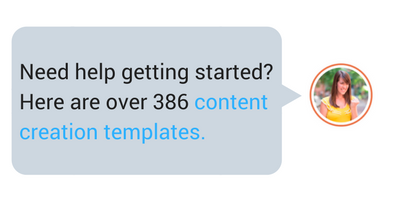Fair warning: Like all good things, it's not going to happen overnight. And it shouldn't, because you're trying to get good at it, not just simply do it. But the sooner you start working these five habits into your routine, the sooner you'll be well on your way to becoming a high-quality content creator.
How to Become a Content Creator
- Read news about your industry every day.
- Write on the regular.
- Study your industry's audience.
- Establish your own voice.
- Curate other people's content (when it makes sense to).
- Understand your KPIs.
- Network at every opportunity.
- Offer solutions, not just commentary.
- Question everything.
1. Read news about your industry every day.
Creating great content that really resonates with your target audience requires you to know what's going on in your industry. And the best content creators scour -- not just read, but scour -- the internet for industry news and trends. This sets them up nicely to understand the context behind what's happened historically in their industry and how that shapes their target audience's mindset in the present.Get in the habit of reading by putting everything you read in one place. You can set up an RSS feed with an app like Feedlyfor blogs you know that contain relevant industry news. Also, ask a few colleagues what they're reading these days and follow suit. Discover where your buyer persona spends time online and snag those blogs, too. Ahead of the game and have a few favorites already? Add 'em to the list.
2. Write on the regular.
If you don't use it, you lose it. Successful content creators understand the importance of constantly flexing their writing muscles. Doing so helps them work through ideas that might be jumbled in their head and identify nuggets that could turn into fully realized ideas later. Successful content creators may not always be inspired to write, but they know something inspiring can come from their writing.Get in the habit of writing by doing it daily or every other day. I'm not saying you need to write a polished, 1500-word essay on an industry-relevant topic daily. Rather, I'm talking about setting aside 10 or 15 minutes to jot down some thoughts and ideas. Figure out when your mind is the clearest -- for most people, that's after or during a cup of coffee -- and just free-form write. What did you read yesterday that stuck with you? What didn't you understand? Asking yourself those questions should start the flow.
3. Study your industry's audience.
One of the hardest pills to swallow as a creative professional is that you are at the mercy of your audience -- and the needs of that audience can sap your creativity.But, at the end of the day, your audience pays your bills. And if you study your audience deeply enough, you'll find interests and creative opportunities you wouldn't have found without them.
The third quality of all successful content creators: They know their audience inside and out. Examine your own readers and viewers: What do they want that you're not yet giving them? What problems do they have that you can solve for them? Here are some other characteristics of your audience you can identify for yourself or for your employer:
- Age
- Gender
- Location
- Family size
- Job title
- Salary
4. Establish your own voice.
Quick reality check: You're not the only content creator in your industry. That means you're not the only one offering the advice, observations, and thought leadership your industry is asking for. There are lots of things you can do to stand out from the other content creators in your field: diversifying into a new content medium, promoting your content on different channels, and naturally gaining experience and trust over time. But even then, the content producers with whom you're competing for attention are doing the same thing.What you can bring to your content, that nobody else can, is your own personal voice.
Readers click on your content for the information, but they come back for the personality. Writing about cybersecurity? Don't just offer fresh insight on today's malware; offer analogies and personal stories of data breaches that justify your insights and that only you can offer. The brand you write for might restrict you from opinionated or overly informal content, but that doesn't mean you can't indulge in the unique perspective that inspired you to join this business in the first place.
Learn how to blend your employer's content guidelines with your own creativity, and you'll become a much more valuable content creator in the long run.
5. Curate other people's content (when it makes sense to).
here's no shortage of people curating content these days. In fact, anyone on the internet can take someone else's content and retweet it, share it on Facebook, pin it -- the list goes on. But successful content creators know it's not enough to take relevant industry news and spit it back out to your fans and followers."You must also position yourself as an expert and genuinely interact with your communities," says Guy Kawasaki, the New York Times best-selling author. Sharing content isn't enough. Engaging with the content you're sharing now makes it unique to you.
Get in the habit of curating content when you have something valuable to add. Now that you've started scouring the internet on a regular basis for industry news, you probably have a wider depth of knowledge than you think. So be confident, and give your readers additional, useful information or even a thought or opinion when sharing others' content. Your networks will appreciate it, and the author probably will too (or it could at least spark a debate -- bonus!).
6. Understand your KPIs.
The internet is a big place (obviously). In fact, it's safe to say it's too big for your content to be discovered by your audience all by itself. In 2018, 61% of professionalsstated that generating traffic and leads was their top marketing challenge.Just because you publish content online doesn't mean you'll get the traffic your insight deserves. To get your content discovered, you first need to focus in on a key performance indicator (KPI), and optimize your content for it. A KPI is a specific metric you've chosen to measure how well your content is doing against your expectations. Modern KPIs include:
- Social media traffic, the number of visitors that come to your content from a social media post.
- Direct traffic, the number of visitors that come to your content by entering your website's URL directly into their browser's address bar.
- Organic traffic, the number of visitors that come to your content from a search engine result link.
- Submissions, the number of people who visit your website and leave having submitted their contact information in exchange for a resource you offered them (a form of lead generation).
7. Network at every opportunity.
Successful content creators know their success is due not only to their passion, but also to those who taught them, inspired them, and pushed them to think in different ways.This is one way content creators grow into successful content creators. They've accepted the fact there's more to learn than what they already know, and they're open to new ways of thinking. Networking forces you to do just that. It's a time to listen to others' ideas and take them into consideration alongside your own.
Get in the habit of networking by seizing the countless opportunities you have to do it. They aren't called social networks for nothing! Spend some time on Twitter, Facebook, and LinkedIn to check out who the thought leaders are in your industry and follow them.
Once you do that, you can ease into in-person networking. If you're not a natural extrovert, the thought of networking can make you cringe. Make it easy on yourself and start small with colleagues. You already have something in common, so striking up a conversation in the kitchen or at your desks shouldn't be too scary.
8. Offer solutions, not just commentary.
When you're just getting started as a content creator, you might already have the knowledge your market is looking for. For successful content creators, however, expertise isn't everything.Want your audience to remember your content? Don't just recite the things you know -- explain why they're important and what your audience can take away from it. The people consuming your content aren't interested in just hearing you talk. They come looking to satisfy specific needs. Whether those needs are to solve a problem to simply increase their confidence in your industry, it's your job to put your market observations into terms they can understand and find lessons in.
9. Question everything.
Polished content creators are curious by nature. They've learned to be curious about the internal knowledge they already have and the external information that's being promoted out in the world. It's the insights that come from this inherent curiosity that makes great content."You need to be curious to identify problems worth solving," says Lorraine Twohill, head of marketing at Google, "and then come up with new solutions." It's these proposed solutions to age-old problems that gets content creators on the radar.
Get in the habit of questioning the status quo by constantly playing devil's advocate. Taking the contrarian view of a piece of content can be difficult at first, but if you start to question why the author thinks this way and what happened in the industry that triggered this viewpoint, you'll begin to think more critically about the content you're consuming. And if you didn't know, critical thinkers make great content creators.
There's a lot of pressure on content creators -- and every inbound marketer, for that matter -- to churn out great content as part of their marketing strategy. Just know that being a successful content creator starts with the habits you form, as they'll set you up to produce some seriously valuable content for your target audience.

- Originally published Dec 5, 2018 7:46:00 PM, updated January 06 2019
Topics:
Content Creation
Content Creation



No comments:
Post a Comment